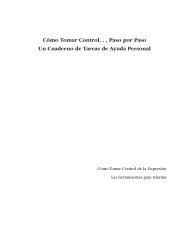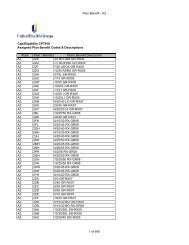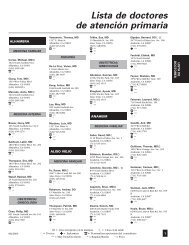CALIFORNIA - Pacificare Health Systems
CALIFORNIA - Pacificare Health Systems
CALIFORNIA - Pacificare Health Systems
You also want an ePaper? Increase the reach of your titles
YUMPU automatically turns print PDFs into web optimized ePapers that Google loves.
2. If a person is covered by two or more Plans<br />
that compute their benefit payments on<br />
the basis of usual and customary fees, any<br />
amount in excess of the highest of the usual<br />
and customary fees for a specific benefit is<br />
not an Allowable Expense.<br />
3. If a person is covered by two or more Plans<br />
that provide benefits or services on the basis<br />
of negotiated fees, an amount in excess of<br />
the highest of the negotiated fees is not an<br />
Allowable Expense.<br />
4. If a person is covered by one Plan that<br />
calculates its benefits or services on the basis<br />
of usual and customary fees and another<br />
Plan that provides its benefits or services<br />
on the basis of negotiated fees, the Primary<br />
Plan’s payment arrangements shall be the<br />
allowable expense for all plans.<br />
5. The amount a benefit is reduced by the<br />
Primary Plan because a Covered Person<br />
does not comply with the Plan provisions.<br />
Examples of these provisions are<br />
precertification of admissions and preferred<br />
Provider arrangements.<br />
D. Claim Determination Period means a calendar<br />
year or that part of the calendar year during<br />
which a person is covered by this Plan.<br />
E. Closed Panel Plan is a plan that provides health<br />
benefits to Covered Persons primarily in the form<br />
of services through a panel of Providers that have<br />
contracted with or are employed by the Plan<br />
and that limits or excludes benefits for services<br />
provided by other Providers, except in cases of<br />
emergency or referral by a panel member.<br />
F. Custodial Parent means a parent awarded<br />
custody by a court decree. In the absence of a<br />
court decree, it is the parent with whom the child<br />
resides more than one half of the calendar year<br />
without regard to any temporary visitation.<br />
Order of Benefit Determination Rules<br />
If the Member is covered by another group <strong>Health</strong><br />
Plan, responsibility for payment of benefits is<br />
determined by the following rules. These rules<br />
indicate the order of payment responsibility among<br />
PacifiCare and other applicable group <strong>Health</strong> Plans by<br />
Payment Responsibility<br />
establishing which plan is primary, secondary and so<br />
on:<br />
A. The Primary Plan pays or provides its benefits as if<br />
the Secondary Plan or Plans did not exist.<br />
B. A Plan that does not contain a coordination of<br />
benefits provision is always primary. There is one<br />
exception: Coverage that is obtained by virtue<br />
of membership in a group that is designed to<br />
supplement a part of a basic package of benefits<br />
may provide that the supplementary coverage<br />
shall be excess to any other parts of the Plan<br />
provided by the contract holder. Examples of<br />
these types of situations are major medical<br />
coverages that are superimposed over base plan<br />
Hospital and surgical benefits and insurance type<br />
coverages that are written in connection with<br />
a closed panel plan to provide out-of-network<br />
benefits.<br />
C. A Plan may consider the benefits paid or provided<br />
by another Plan in determining its benefits only<br />
when it is secondary to that other Plan.<br />
D. The first of the following rules that describes<br />
which Plan pays its benefits before another Plan is<br />
the rule that will apply.<br />
1. Subscriber (Non-Dependent) or<br />
Dependent. The Plan that covers the person<br />
other than as a Dependent; for example, as<br />
an employee, Member, Subscriber or retiree<br />
is primary and the Plan that covers the<br />
person as a Dependent is secondary.<br />
2. Child Covered Under More Than One<br />
Plan. The order of benefits when a child is<br />
covered by more than one plan is:<br />
a. Birthday Rule. The Primary Plan is the<br />
Plan of the parent whose birthday is<br />
earlier in the year if:<br />
– The parents are married;<br />
– The parents are not separated<br />
(whether or not they ever have been<br />
married); or<br />
– A court decree awards joint custody<br />
without specifying that one party has<br />
the responsibility to provide health<br />
care coverage.<br />
Questions? Call the Customer Service Department at 1-800-624-8822. 87<br />
PART A








